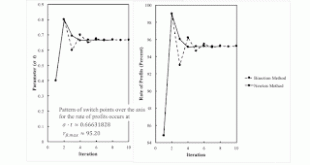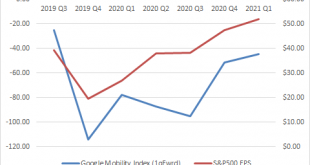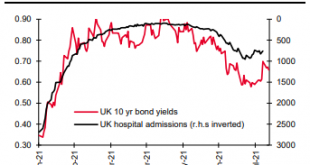In our last post we saw that private sector indices for used car prices and for rent prices were highly predictive of future changes in the corresponding CPI component indices. The next logical step is obvious: we should use this information to build an aggregate CPI index that factors in this forward-looking information to get a prediction of inflation over the next six months. In all honesty, I was a little reticent to do this. Not to put too fine a point on it, but it is a...
Read More »Using Private Sector Data to Forecast Future CPI Moves
Back in early August, my old colleague James Montier and I released a White Paper on inflation. In it we argued that our baseline scenario was that we would see transitory inflation caused by the extreme supply shocks caused by the lockdowns. We drew an analogy to the end of rationing in Britain after WWII, where we saw temporary price increases in the markets for rationed goods. Further, we argued that any sustained inflation would require a wage-price spiral. That is, in order...
Read More »How To Find Fluke Switch Points
Figure 1: Convergence to a Pattern of Switch Points over the Axis for the Rate of Profits1.0 Introduction This post illustrates how to find fluke switch points. As usual, I proceed by example, in this case, as taken from my paper in Structural Change and Economic Dynamics. 2.0 Technoplogy In this example of a capitalist economy, two commodities, iron and corn, are produced. One process is known for producing iron. In the iron industry, workers use inputs of iron and corn to produce an...
Read More »Podcast Appearence on the Bullhouse
Yesterday I appeared on the Bullhouse podcast with Kenna for a very interesting discussion about a wide range of financial and economic topics. We discussed a number of different topics. Some of these were as follows: Whether there is a property bubble in the US and internationally right now.The potential bubble in the junk bond market and its implications.Why the risks in the market for rental properties are idiosyncratic this time around.How real estate is now a financial...
Read More »Systematic Detection of Housing Bubble – Part II: Linear Trends and Points-Based Detection
In the last piece on detecting housing market bubbles, I an through some of the problems with using standard-scoring. Here I will provide two solutions; one complex, the other simple. But before we move forward with this, we must understand one other problem when it comes to determining whether a housing bubble is indeed a housing bubble. This problem is not, like standard-scoring, related to how we manipulate the data. Rather it is related to how we define a housing bubble itself....
Read More »Systematic Detection of Housing Bubble – Part I: Z-Scoring and It’s Problems
In a recent piece in Newsweek that got some attention, I made the case that the United States is currently experiencing a housing bubble. The next logical question is obvious: are other countries? After all, the 2008 meltdown was a global crisis; the US was not alone in its housing bubble. In order to try to detect housing bubbles ideally we would like some sort of systematic framework that we can deploy. The problems with using this approach when it comes to hosuing bubbles,...
Read More »Quantifying the Impact of Vaccine Failure on Earnings Per Share
In a post last week, I raised the possibility that the vaccines might not get the virus under control this winter. Since the markets still seem to be pricing in vaccine success, this could have implications for investors. How might we think this through in more depth? One way to do this is by looking at the Google Mobility Index and seeing if it is any good at explaining EPS growth in the S&P. Here I take an aggregate construction from the index that encompasses all of the...
Read More »Double Bubble Trouble
Two weeks ago I wrote a piece for Newsweek outlining potential troubles in the junk bond market. I pointed out that there is a strong possibility that enormous junk bond issuance is floating companies that otherwise would have gone bankrupt due to the lockdown measures. Here is that piece: The Next Financial Crisis is Coming But that is not the only bubble on the horizon. The lockdowns and work-from-home appears to have driven investors pretty kooky because we also have what...
Read More »Ben Franklin, Proto Marxist
Ben Franklin was one the founding fathers of the United States. He participated in the constitutional convention. He was the first Postmaster General. He did experiments with electricity, when the Leyden jar was a new thing. There is a story about flying a kite in a thunderstorm. He also wrote about the wealth of nations: "Finally, there seem to be but three ways for a nation to acquire wealth. The first is by war, as the Romans did, in plundering their conquered neighbors. This is...
Read More »Vaccine Failure, Market Expectations and Inflated Valuations
For the last year and a half the biggest sentiment driver in markets has undoutedly been COVID-19. This is perfectly reasonable as the virus is probably the biggest single driver of variables that matter in financial markets – from inflation expectations to earnings. Yet it has been striking that most financial analysts have been outsourcing their analysis of the trajectory of the virus to those in public health. In theory this is reasonable. Many are assuming that the public...
Read More » Heterodox
Heterodox







